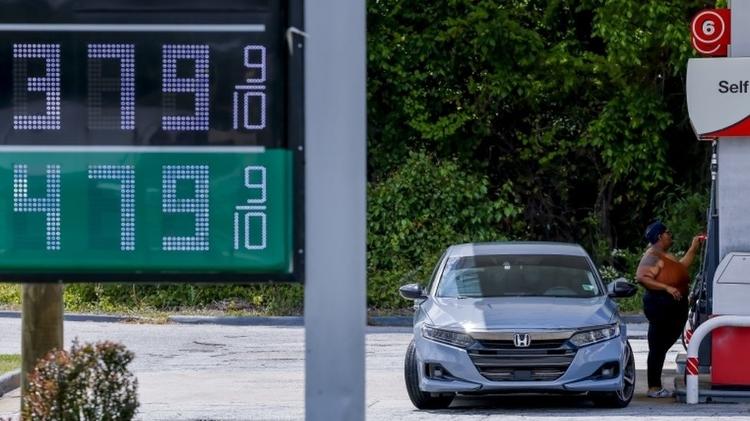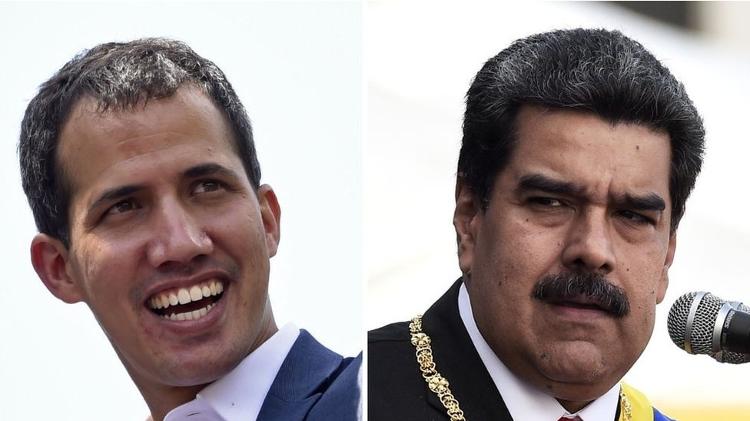Oil prices, pressure from other leaders in Latin America, the desire to force a resumption of negotiations in the country and reverse Trump’s agenda all explain the Biden administration’s controversial action.
Has the US government announced this Tuesday (5/17) it will ease some of the sanctions imposed on the Venezuelan economy? Penalties created in response to what Washington sees as undemocratic actions by the Nicolás Maduro regime.
The move came at the request of the Venezuelan opposition led by Juan Guaidó, whom the Americans recognize as the country’s interim president, according to senior Biden administration officials.
According to the Americans, Guaidó would agree to return to the negotiating table with the Maduro regime in Mexico City for the elections. Trading has been suspended since October 2021.
“We reiterate our full willingness to urgently build a major political agreement that will allow Venezuela to recover through the democratic reinstitutionalization of the country,” the group Plataforma Unitário, which brings together different factions of the opposition to Chavismo, said in a statement.
The Maduro government congratulated the announcement, and Delcy Rodriguez, the country’s vice president, said it hoped all sanctions would be lifted.
Oil and inflation
The move comes after the US resorted to talks with members of Maduro’s government in March to resume talks and explore the possibility of reopening its market to Venezuelan oil, which is currently under sanctions and will mitigate the effects of the fuel produced inflation crisis. Because of the embargoes imposed on Russian products after Vladimir Putin’s invasion of Ukraine by Russia.
At the time, Senate Majority Leader Dick Durbin (D-IL) explained the choice between banning Russian oil and restarting negotiations with Venezuela: “Worse still, Putin slaughters innocent Ukrainians all day or does business with the devil for a while. day?”
The start of the war in Ukraine represented a nearly 20% increase in the prices seen by the Americans at gas stations; this was a significant impact in a country facing the highest inflation in 40 years. That’s an election risk for the Biden administration, which will have to face mid-term legislative elections by the end of the year.
But US officials deny that the easing of sanctions against Venezuela now has anything to do with global fuel demand or domestic pressure from inflation, saying the change is the result of advancing negotiations led by Venezuelans themselves.
“Our focus was on supporting (Guaidó’s) interim government to enable the (Maduro) regime to take negotiating steps towards free and fair elections. The focus is not on the oil sector or fuel prices.” US officials participating in the negotiations
Sanction relief measures have not yet been extensively detailed by the US government, but BBC News Brasil has learned that the US Treasury, along with the State Department, has granted US oil company Chevron a license authorizing it to negotiate terms of potential activities. Economic future in Venezuela
However, the license still does not allow exploration and export of oil from Venezuelan fields. In the words of an adviser to the Biden administration, this would simply be permission to “speak”. The Americans are also expected to announce that some trade names have been removed from their sanctions lists soon.
“None of these pressure reductions should lead to an increase in the revenue of the (Maduro) regime,” said a US official familiar with the measures.
However, this argument has been met with skepticism among scholars regarding the relationship between the United States and Latin America.
“The Biden administration says Chevron cannot extract oil, it will only negotiate with PDVSA (Venezuela state oil company). But what do oil companies do other than extract and export oil? The American people are not that stupid. Sooner or later Chevron will discover oil and PDVSA will benefit from this,” says Ryan Berg, Latin America researcher at the Center for Strategy and International Studies.
Help at whose request?
Berg points out that the Biden administration’s moves against Venezuela have created discomfort in the country and the region.
According to diplomats interviewed by BBC News Brasil, neither the Venezuelan opposition nor partners such as Brazil and Colombia were warned in advance of Biden’s envoys’ lightning visit to the Maduro regime in March.
Among those countries that supported Washington’s neighborly policy—recognizing Guaidó as head of state—there were doubts about the meaning of the US government’s actions. During a recent visit to Brazil, a high-level delegation from the State Department reiterated to Brazilians that nothing has changed in the US-Venezuela relationship.
Now, faced with a change that could have significant implications for the region, Americans are trying to convey the message that their actions took place at Guaidó’s request.
“I would like to make it clear here that the US is doing this in response to actions and speeches that took place on a platform of unity between the regime (Maduro) and the interim government (Guaidó) without the help of the US. A senior Biden administration official said, “This is a relationship between and between them. “It was a conversation and they came to us to ask us to take these measures,” he said.
The Biden administration would have liked to reverse its policy of “maximum pressure” in sanctions against Venezuela, long ago inherited from the administration of Republican Donald Trump, Berg told BBC News Brazil.
But for this, Maduro’s government had to make progress in negotiations with the opposition at the Norwegian-mediated talks in Mexico City.
However, negotiations erupted in October when US justice extradited Maduro’s ally, Alex Saab, from Cape Verde to serve his sentence in the United States for money laundering related to Saab’s activities with the Venezuelan government.
For Maduro, this act amounted to a breach of trust and the government was off the table. Washington would hold its first meeting in March to withdraw it and now ease sanctions.
“It’s strange that a powerful country like the United States visited in March and now lifts sanctions in exchange for as slight a compromise as to get back to the negotiating table,” says Berg.
In an article published Monday by Foreign Policy magazine, just a day before the US announcement, Isadora Zubillaga, assistant secretary of state in Juan Guaidó’s cabinet, casts doubt on who backs the sanctions relief agreed by the White House, and what it is. the truth behind the decision.
“As a long-time supporter of Venezuelan democracy, I firmly believe that ignoring the Maduro dictatorship (and doing business with Venezuela) in hopes of lowering domestic energy prices in the United States is not only ethically problematic, but also inefficient and ineffective. Venezuela will not bring the United States down. Zubillaga, He wrote that in the short or medium term, fuel prices will not serve Venezuelans’ long-term goals of providing a free and democratic country.
Is it on the verge of a fiasco in Latin America?
The Biden administration’s new stance on Venezuela comes on the eve of the Summit of the Americas, which the United States will host in Los Angeles in June.
And while Americans are determined to promote a meeting that conveys the perception that the continent is united around the Biden administration’s leadership to the world, and especially to Russia and China, the event’s organization is slipping and powerful leaders are threatening. not participate.
This is the case of Mexican president Andrés Manuel López Obrador, who threatened to miss the event. Recently, Obrador referred to leaders of Nicaragua, Cuba and Venezuela who should not have been invited, saying Washington should not exclude anyone from the meeting.
The diasporas of the latter two countries are politically strong in the United States – especially in the shaky state of Florida – and are opposed to any concessions by Americans to the governments of their country, which is considered a dictatorship by the United States. Faced with the need to compete for control of Congress, the Biden administration has made it clear that it does not consider inviting the three countries to the meeting in Los Angeles as negotiable. By doing this, he’s making a risky domestic move if he’s protected himself with Latino communities in the US by easing sanctions on Venezuela.
“Still, Biden decided to take risks with his domestic audience by lifting sanctions on Venezuela and reducing pressure on Cuba,” Berg said in an announcement this week, referring to allowing more remittances to the island under the communist regime. “He may be making it as a concession to the Obrador, or so he may say, but it’s accumulating wear and tear, inside and out.”
Ronald Sanders, the US Ambassador to Antigua and Barbuda, recently sent a message to the State Department that if Cuba were excluded, most Caribbean leaders would be willing to skip the meeting. The possibility that there is no Guaidó representative other than the Maduro administration is also disturbing.
The tension surrounding the event caught the attention of one of the US’s global adversaries.
“Cuba, Nicaragua, and Venezuela are not countries of the Americas?” Chinese Foreign Ministry spokesman asked Zhao Lijian.
Brazilian President Jair Bolsonaro is also threatening not to come. Bolsonaro, a known ally of Trump, is uncomfortable with never having had personal contact with the current American president, who took office in January last year.
Additionally, messages to Brazil to stop casting doubts on the October election process and public comments from the Biden administration that Brazil will be on the “wrong side of history” due to Bolsonaro’s visit to Putin in Moscow a week ago. broke out, creating a perception in Planalto that getting in touch with Biden in the middle of a pre-election campaign won’t do much.
For analysts in Latin America, in his year and a half in government, Biden, after making great strides during the Trump administration, has failed to set an agenda for the region that has moved beyond the obvious immigration issue and brought countries closer to Washington. . Latin diplomats interviewed by BBC News Brazil say the administration has been slow to offer financing and investment lines in infrastructure and trade for a region suffering from low growth (or recession) and high inflation.
In the words of the American website Politico, the Biden incident “bred boos and threats of boycott” rather than uniting the continent.
“What is clear is that the Biden administration does not have a Latin American policy that creates strong incentives for Latin American leaders to be present and high costs for those who missed the meeting. I think it could be not just a failure, it could be a failure of US power in the Western Hemisphere. It’s an epic sign of his downfall,” says Berg.
source: Noticias


